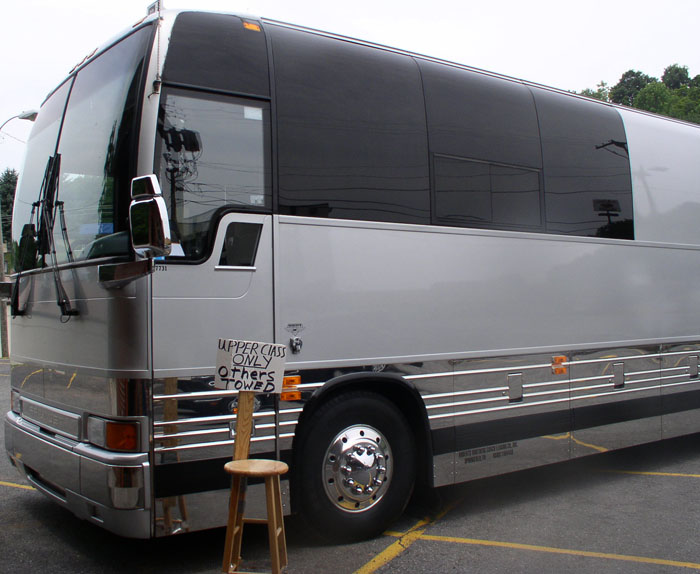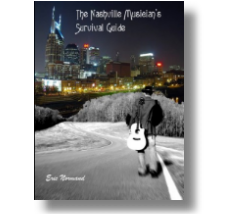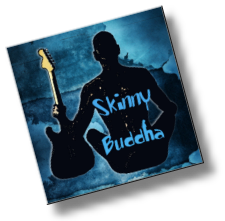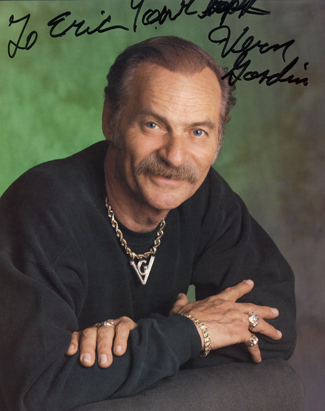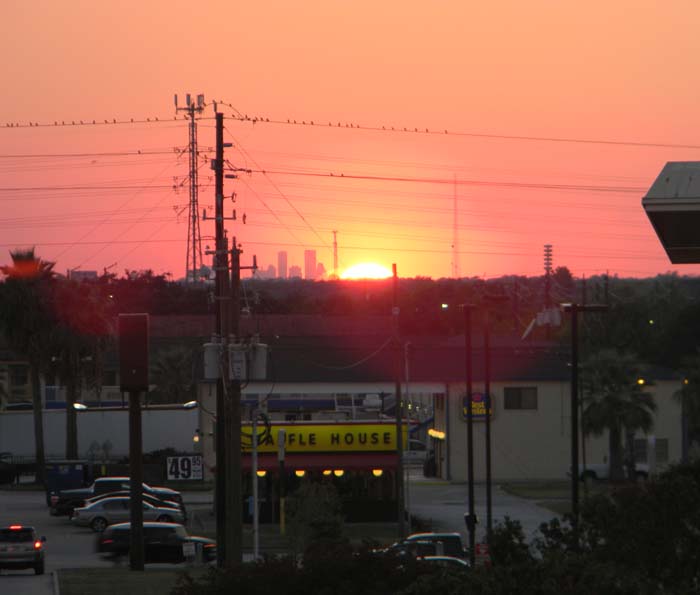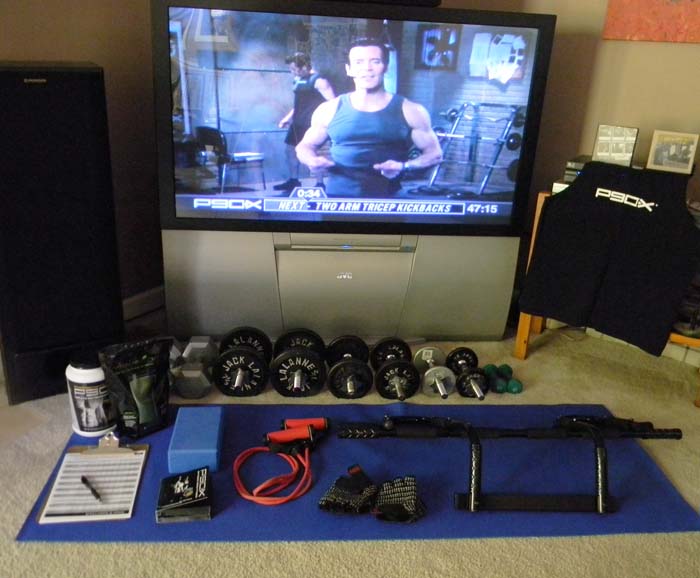
Having grown up in the Northeast on a diet of rock and blues, and listening to very little country music prior to moving to Nashville, the name Vern Gosdin was not one I was familiar with. So when I got a late-night phone call in the fall of 2002 about playing a show with him, my initial reaction may have been somewhat muted. The call came from a producer named Kenny whom I had met a few weeks earlier at my house gig at Libby’s. He described the show as being a one-off with Vern to somewhere in Kentucky and asked me if I could put together and rehearse a band. Hungry for work, I accepted the show and began making calls to recruit players the next day.
One of the first calls I made was to D for some advice. “Vern Gosdin! Do you realize who he is?” he replied in amazement. “Well I know he had some success a few years back.” I replied unknowingly. “They call him ‘the voice’ of country. It’s like getting a gig with Merle Haggard. I’ve been here 10 years and I’ve never got to play with him.” a hint of jealousy riddled his voice. “He’s a real legend. This will be a great experience for you.”
D’s excited reaction prompted a little further investigation, which of course revealed that ole Vern was sure enough a bona fide superstar. 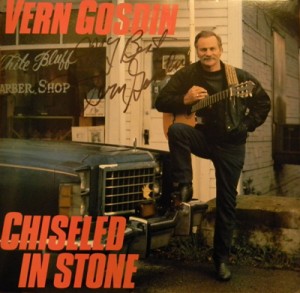 In a career that spanned over four decades, he had recorded somewhere around 20 albums yielding roughly the same number of top 10 hits. Now I began to get a little nervous. Always up for a good challenge, I began calling some of the better players I had met over the past couple of months. The role of a bandleader in Nashville, I quickly learned, puts one in the unique position of being able to offer work to other players, and in Nashville, work is something there is never enough of. Once people know you’re a bandleader, phone calls start getting returned with more expediency and other musicians seem to have more interest in you when you walk into a room (of course when things go wrong, you will be the first one everyone looks to).
In a career that spanned over four decades, he had recorded somewhere around 20 albums yielding roughly the same number of top 10 hits. Now I began to get a little nervous. Always up for a good challenge, I began calling some of the better players I had met over the past couple of months. The role of a bandleader in Nashville, I quickly learned, puts one in the unique position of being able to offer work to other players, and in Nashville, work is something there is never enough of. Once people know you’re a bandleader, phone calls start getting returned with more expediency and other musicians seem to have more interest in you when you walk into a room (of course when things go wrong, you will be the first one everyone looks to).
Within a few days I had put together a five piece band of the best players I could find consisting of Chip on drums, Sid on bass, Mark on keys, Brian on steel, and me on guitar. I obtained recordings of Vern’s material from his assistant, charted the songs, and dispersed these materials to the other players. As the show date grew closer, Vern’s assistant notified me that one rehearsal would be required the week of the show. I also learned that we would need to provide transportation for Vern to and from the rehearsal, as he no longer drove.
On the day of the rehearsal, a couple of the band guys that lived close to Vern’s home near Opryland stopped by to pick him up. My only encounter with Vern up to this point had been one brief phone call, and our discussion was so brief that I still had yet to gain a real sense of the man. Over the weeks leading up to this rehearsal I had begun hearing a few horror stories about Vern. Apparently, he had a penchant for firing drummers, at least according to the rumors, and had a reputation of being quite “ornery” from time to time. He had even been known to pull a gun on a few unsuspecting musicians over the years, supposedly.
This was not the Vern that I would meet later on that night. For into my house walked one of the kindest, sweetest fellows you could ever meet. He had a sense of humor too, as we all learned when I was the butt of his first joke on this night. “How are you feeling today?” he asked. “Great, thanks.” I replied. “Well it’s a good thing that you don’t feel like you look.” he responded as muted chuckles engulfed the room. This kind of dry humor was apparently typical for Vern as I would later learn.
I had rearranged my basement music room to accommodate this band rehearsal, and the limited space was quickly filled with gear and bodies. Once the gear was up and running, our rehearsal began. Another thing that I would later learn was that Vern had suffered a stroke in recent years, and this often impeded his communicative ability. Several songs were stopped short when he needed to convey different musical ideas – signature licks, key changes, intros, endings – he couldn’t always communicate exactly what he was thinking, but it became obvious that he knew his music well, and that he knew when something wasn’t being played right.
We did our best to make his songs feel right to him, and although the mood of this night was fairly upbeat, the rehearsal wound up being shorter than optimum for us, and longer than optimum for Vern. He was getting tired and called the night before we could get through all of the material, rendering it essential that the band be extra prepared for the gig.
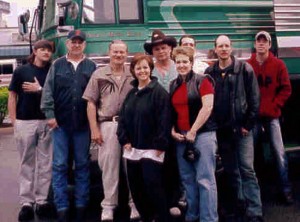 A few days later we all met at Fiddlers Inn near Opryland and hopped on a bus bound for a show in Kentucky. We rode the bus for a few hours before arriving at our gig where we loaded in, sound checked, and ran a few tunes. We did two shows that night in a midsized venue that was reminiscent of an old church out of yesteryear. The two sets were night and day by comparison, the first being quite bad as Vern was feeling a bit under the weather. We did our best to hold it together behind him, but it was a struggle. After a long break, during which Vern got some food and rest, we hit the stage again for our second and final show. Vern, now feeling much better, performed brilliantly. His sweet, resonant voice conveying a wide spectrum of emotions, I could now hear why he had been deemed “the voice” by so many. This strong vocal performance made it effortless for the band to follow him – We were on! The show ended to a strong applause and a room full of smiles. We had done what we had set out to do, and were on our way home.
A few days later we all met at Fiddlers Inn near Opryland and hopped on a bus bound for a show in Kentucky. We rode the bus for a few hours before arriving at our gig where we loaded in, sound checked, and ran a few tunes. We did two shows that night in a midsized venue that was reminiscent of an old church out of yesteryear. The two sets were night and day by comparison, the first being quite bad as Vern was feeling a bit under the weather. We did our best to hold it together behind him, but it was a struggle. After a long break, during which Vern got some food and rest, we hit the stage again for our second and final show. Vern, now feeling much better, performed brilliantly. His sweet, resonant voice conveying a wide spectrum of emotions, I could now hear why he had been deemed “the voice” by so many. This strong vocal performance made it effortless for the band to follow him – We were on! The show ended to a strong applause and a room full of smiles. We had done what we had set out to do, and were on our way home.
Over the next year I played a handful of dates with Vern, and remained as bandleader and guitarist through my tenure with him. About a year later I started working on a busy tour and could no longer do Vern’s dates. But during that time we had become good friends, and years later he still called me from time to time to say hi. He had a handful of jokes that weren’t particularly funny, that somehow made me laugh anyway. I would be walking around a supermarket or Wal-Mart and the phone would ring – “Hey son, it’s Vern, I’ve got to ask you something. Do you hear that sound?” “What is it?” I would ask. “It’s the sound of my boot hittin’ your ass!”
He would literally start out every conversation with a joke like this, and I would laugh every single time. Around 2008 I was fortunate enough to have a schedule that would allow me to do a few more shows with him. Then I heard the sad news in April of 2009 that he had died from complications due to another stroke. “The Voice” of country may have moved on, but his musical legacy remains a timeless testament to his greatness. And the Vern that I grew to know and love will always hold a special place in my heart. Even though I know he won’t be calling any time soon, I still keep his number in my cell phone, just in case.
October 8, 2010 – Dallas, Texas
We left Nashville Thursday at midnight, bound for two shows deep in the heart of oil country, the first being at the oversized dance hall, Cowboys Red River in Dallas, Texas. Our regular bassist, Clint Jacobs, absent on this particular run, I sat in the front lounge chatting with his sub, friend and longtime Nashville veteran, Mike Chapman for a bit before heading to bed. This trip would normally take about 10 to 11 hours, but at about 5 AM I awoke and realized we had been stopped for a little bit. I drifted off for a while and when I got up around 10 I learned that Steve, our bus driver, got stuck in a massive traffic backup for three hours in the middle of the night, the result of an overturned tractor-trailer that had blocked the interstate. Scenarios like this are why we always allow for extra travel time on these trips. Nevertheless, the extra three hour wait added on to the middle of this 700 mile drive had left Steve exhausted, and we finally pulled into Dallas around 1:30.
As we entered the dark Honky Tonk, we noticed that musky stale beer odor inherent to these kinds of places, the kind of deep rooted 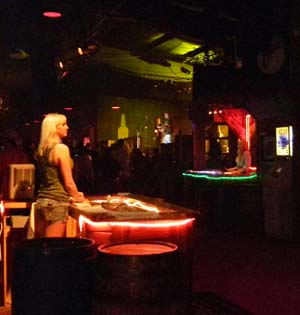 lingering odor that takes decades to create, and while barely noticeable amidst the hustle and bustle of nighttime business, is almost overbearing during the empty daytime hours. While we were setting up, Rhett had the runner take him on a brief tour Dealey Plaza, the infamous location of the assassination of JFK. A little while later he returned with some memorabilia, as apparently a JFK assassination history buff has some kind of ‘merch table‘ at this location. I’m not sure if this is somebody’s desire to inform the masses of this tragic conspiracy, or simply capitalism at its worst. (Maybe it’s a little of both.)
lingering odor that takes decades to create, and while barely noticeable amidst the hustle and bustle of nighttime business, is almost overbearing during the empty daytime hours. While we were setting up, Rhett had the runner take him on a brief tour Dealey Plaza, the infamous location of the assassination of JFK. A little while later he returned with some memorabilia, as apparently a JFK assassination history buff has some kind of ‘merch table‘ at this location. I’m not sure if this is somebody’s desire to inform the masses of this tragic conspiracy, or simply capitalism at its worst. (Maybe it’s a little of both.)
Other than watching a little bit of a fascinating assassination documentary, the rest of this day, and night for that matter, were rather uneventful. I wish I could say that it was an exciting memorable show, like most of our shows, but it wasn’t. The audience just kinda laid there. Don’t get me wrong, the 1500 or so in attendance danced and drank, and even made some noise after some songs, it was just one of those nights that felt like it never quite got there. I later reiterated to Rhett one of the tour’s long standing inside jokes “Out of all the shows we’ve ever done together, that was definitely one of them.”
Onward to Baytown
Baytown is a suburb of Houston, and a city of roughly 80,000 deep in the heart of oil country. We arrived to a hotel parking lot in the wee hours of the morning and taxied the bus over for load in around noon. On the previous day, everything had gone according to plan with no surprises, while this day would turn out to be full of surprises, the first being my discovery of a miscommunication regarding our ‘bus stock’. Our bus stock is a list of beverage and food items which appears on our rider, and is required, in most cases, to be delivered to our bus upon arrival as it serves to be lunch for our crew. I never got the memo that they wouldn’t be providing this and, fortunately, they were gracious enough to send somebody for it at the last-minute.
The next surprise came a couple of minutes later when the event coordinator informed me that they were having problems with the rented generator. It turns out that the generator rental company arrived earlier in the morning to drop off the generator, and then left without showing anybody how to work it. Around the same point in time I was introduced to the house sound technician whose introduction consisted of “Glad to meet you, I hope you brought a lot of patience with you because we’re running way behind.” “Glad to meet you too.” Next would come what was perhaps the biggest hurdle we would have to overcome on this day that was quickly evolving into what I commonly refer to as “a challenge” otherwise known as a good old-fashioned pain in the ass. That being, the stage from hell.
Upon setting foot upon this tin nightmare, I was baffled to see a gaping four-inch wide “space” that ran lengthwise across the 30 foot stage at about 5 foot intervals. “Well that’s a great way to break an ankle if I’ve ever seen one!” I commented to the promoter, who acknowledged “Yeah it is, I didn’t notice that before.” To make matters worse, a round piece of steel pipe protruded upward from this “space” at 6 foot intervals, serving as a strategic array of would-be landmines for everybody to trip over for the day. After some discussion with the promoter, we determined that we needed some rubber mats or plywood to place on top of this unsafe deck. A little while later I discovered a huge role of thick old industrial carpet backstage and, while it initially looked like it might serve our purpose, I quickly discovered that it was full of “fire ants”. I also learned, very quickly mind you, that fire ant’s bite! The bites on my fingers and hand still swollen as I write this.
One of the event coordinators suggested some four by eight sheets of rubber matting and, after I concurred that it might work, he set out for Home Depot. Around this time, I asked Scott, our other guitarist and part-time “Macgyver” if he could try to figure out the generator issue. A little while later a truck arrived with 10 sheets of rubber matting and I began to direct some stagehands to help ‘rubberize’ our stage while Scott dug into the genie. A couple of hours later and the stage was covered with a solid rubber matting (we had to cut holes for the protruding steel pipe with a drill and utility knife), Scott had brought the generator to life, and we began our load in and sound check.
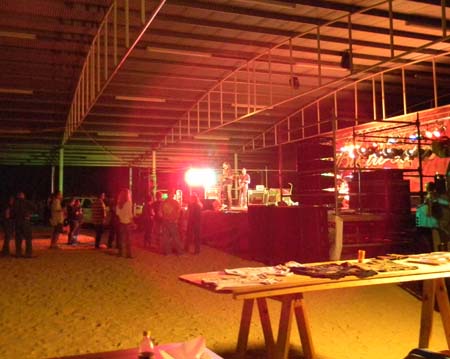 After the sound check, we all feasted on some locally famous barbecue, and went to the hotel for some downtime before the show. I returned to the venue around 7:30 hoping to catch some of up and coming and Nashville based Matt Stillwell’s, set. Unfortunately, because one of the other acts, George Dukas, was running late, their performance times were swapped, and I arrived after their show had already ended. We began our show at 9:30 on the dot, surprisingly right on time considering the chaotic mess of the day we had just encountered. This event was the annual “Helping a Hero Benefit” put on by the Baytown Police Department, and served to help raise money for a fund for families of officers lost in the line of duty. While the attendance was less than desired, the quality of the audience was anything but lacking. A handful of town folk that did show up spent quite a bit of money on some big dollar auction items for this great cause and stayed for the entirety of our 90 minute set. Mike Chapman, who had only played with us on a couple of other occasions, nailed the show to the floor, his 3+ decades working in the Nashville music industry recording with such giants as Garth Brooks, LeeAnn Rimes, and countless others, no doubt aiding in his proficiency.
After the sound check, we all feasted on some locally famous barbecue, and went to the hotel for some downtime before the show. I returned to the venue around 7:30 hoping to catch some of up and coming and Nashville based Matt Stillwell’s, set. Unfortunately, because one of the other acts, George Dukas, was running late, their performance times were swapped, and I arrived after their show had already ended. We began our show at 9:30 on the dot, surprisingly right on time considering the chaotic mess of the day we had just encountered. This event was the annual “Helping a Hero Benefit” put on by the Baytown Police Department, and served to help raise money for a fund for families of officers lost in the line of duty. While the attendance was less than desired, the quality of the audience was anything but lacking. A handful of town folk that did show up spent quite a bit of money on some big dollar auction items for this great cause and stayed for the entirety of our 90 minute set. Mike Chapman, who had only played with us on a couple of other occasions, nailed the show to the floor, his 3+ decades working in the Nashville music industry recording with such giants as Garth Brooks, LeeAnn Rimes, and countless others, no doubt aiding in his proficiency.
This stressful day came together as the result of a lot of teamwork. Scott, with some background in electronics, was apparently the only person on site possessing the knowledge it would take to make that generator come to life and power the show. The Baytown police went and purchased the rubber mats for the stage. Our bus driver, Steve provided some of the tools that were necessary for our rubber stage modifications. Matt Stillwell and band was gracious enough to perform their show two hours ahead of schedule. In hindsight, it’s funny, even kind of ironic, that while the day before had gone so smoothly, and it’s show had felt so sluggish (despite a crowd of almost 2000), that this difficult day, despite its low attendance and being full of problems, delivered a concert experience that was far more rewarding. Put these two wildly different events and shows together and you wind up with one great day and one great show – A fitting end to our 2010 touring season.
Becoming a successful musician or an entertainer in the 21st century is a tough endeavor. It’s probably as difficult as becoming a successful actor in Hollywood. In this field of extreme competitors, you need to have every advantage you possibly can. Even if you aren’t going after the big prize, for many musicians, a lifetime of pursuing their craft will still take its toll. This is why it is in the best interest of most musicians to be physically fit.
If you are a musician, whether you play guitar, drums, sing, saxophone, or other, you inevitably fall into one of two categories; 1.) Professional musicians, semi professional musicians, and musicians aspiring to become professionals, or 2.) Amateur musicians, hobbyists, and musicians that play solely for expression, art, or the fun of it, regardless of compensation.
If you are either working as a professional musician, or aspiring to do so, you probably already know how competitive this field is (if you don’t, you might want to take a look around you). To earn a living as a musician in this day and age, or at least a partial living, a great many things must come into alignment. Talent, social skills, looks, longevity, and luck are some of the essential components. Since you really can’t control luck, and assuming you have some talent and social skills and are already honing those traits, that leaves looks and longevity up for grabs. This is where physical fitness comes into play.
Looking Good
I chose to address this factor first because so much of what happens in the entertainment industry is based on appearances. As superficial as this may be, it is simply a fact, and one that shouldn’t be overlooked. While I do feel that looks and talent shouldn’t have to be tied together, the focus here is on the music business, so I’ll save that discussion for another time.
We have a strange way of approaching how we look in our society, that being that we tend to put makeup on a pig. I’m sure you’ve heard that expression before, but here’s my spin on it. How many times have you seen some performer, whether on TV or in a nightclub, who has obviously put a lot of thought into his or her wardrobe and appearance? $300 haircuts, pre-ripped and pre-faded designer jeans, fancy shirts, eye-catching jewelry, makeup, even an obvious obsession with tanning is evident for some. Yet when you look at the performer’s arms , there isn’t a hint of muscle tone to be found anywhere. Even though they aren’t obviously overweight, you can’t help but notice their ass looks just a little too big for the outfit struggling to hide it. Or perhaps he or she has no ass all, flat as a board on the backside due to the fact that they have no muscles there either. Of course this description would describe many people in almost any field. As most Americans are now overweight, each year the numbers steadily increasing, so is our desire to attempt to mask this fact with fancy haircuts, designer clothes, spray-on tans, and makeup.
But if you are aspiring to be a professional musician, you are different than most people, you are in the world of showbiz. This means that, in many cases, your appearance is directly tied to your career, and sooner or later you will be judged on your looks. So rather than continuing to follow the trend of ‘putting makeup on a pig’ why not address the issue at its core and put more emphasis on physical fitness. There is a difference between being skinny, a little overweight, and being physically fit. I have been skinny for most of my life, but I have not always been fit. When you are physically fit clothes automatically hang better, your skin color looks better, and your face looks younger. People who are physically fit tend to have increased energy and stamina, and this helps to project a more youthful vibe in general. Not to mention the increased confidence and sex appeal that can come with being in great shape. With the music and entertainment industries now more competitive than ever, there is simply no excuse to not look as good as you possibly can. A fancy haircut and designer clothes aren’t going to fool everybody.
Longevity
To me, the need for longevity makes the best case for being physically fit, and this applies to all musicians, pro or otherwise. From the time we were teenagers, through our 20s, even into our 30s, typically, our bodies are still functioning under their original drivetrain warranty, meaning that, at least for most of us, things aren’t yet starting to go wrong on the grand scale that they eventually will. If you are a young person and reading this, you’re probably thinking “That’s the kind of crap my grandfather used to tell me.” Well I hate to say it, but ol’ grandpa was right. As our bodies age our joints begin to wear, we become more susceptible to injuries, injuries take longer to heal, and a whole host of other problems ranging from high blood pressure to heart disease and beyond start becoming more likely. I’ve had tendinitis for five years now, and sometimes it interferes with my playing. Some of my musician friends, after decades of problem free careers, are now starting to have their own problems too. Everything from back problems to carpal tunnel and even diabetes and strokes are now interfering with their careers and lives.
The effects of aging can and will happen to people from all walks of life, but the hard lifestyles of many musicians can further amplify the effects of aging. Being a musician is stressful, often requires extensive travel, and for many of us, requires a repetitive hand, arm, or leg motion that is certain to lead to problems. Being physically fit is the only way to combat these problems. Alcohol or drugs, whether prescribed or other, are only a band-aid, and for many, masking the pain in this way can lead to further injury. Being a career musician, I often have little to no choice about the gigs I need to take to make a living. Sometimes I will play a 3 1/2 hour show nonstop. This requires great stamina and, even though I am in good shape, sometimes my whole body aches after a long hard gig. How much worse would I hurt if I didn’t take care of myself? I still have to load my gear into my car regularly and my Vox amp weighs almost 100 pounds. Over the years, I’ve thrown out my back doing this on more than one occasion, being physically fit helps combat this as well. Regular exercise has been the best weapon against my tendinitis too. Without regular stretching and exercise it quickly becomes almost unbearable.
In the world in which we live and work, a world full of extreme competition, an extreme approach to health and fitness simply makes sense. Some people say that America has the best workforce in the world. If this is true, shouldn’t the best workers be in tip top shape? You can either continue ‘putting makeup on the pig’, or you can work towards becoming fit and give yourself a real leg up on the competition. Even if you don’t aspire to play professionally being fit will help ensure the likelihood of enjoying your hobby or art for years to come. As far as achieving an extreme level of physical fitness, there is no shortcut. It can only be achieved with good old-fashioned hard work which involves a lifelong commitment to regular exercise and healthy eating.
Do you want to look good when you’re 50? Do you want to still be able to play music effortlessly when you’re 60? I do.
This past weekend was one of the last outings of the 2010 festival season for Rhett Akins and gang. Like many things in life, outdoor festivals are like a potluck dinner – you never know what’s under the lid of that next casserole dish. That goes for not just the event itself, but to the friend and foe of every outdoor show – the weather. We’ll get to the weather debacle in a minute.
The event we would be playing on this eve was ‘The Old Threshers’ at the Shelbina Fairgrounds, in Shelbina Missouri. For those of you 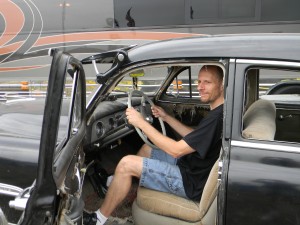 not in the know, an old threshers event is kind of a fair with a tractor theme, and this event sported some rare old beauties right out of yesteryear. After parking our bus and getting situated, we took a walk around the fairgrounds to see the sights. We didn’t get but 5 feet from the bus door when the first spectacle presented itself in the form of a 51 Chevy, the owner of which notified us that this vehicle was ours to use for the day. Who needs a runner when you’ve got a 51 Chevy at your disposal! After a few minutes of checking out and photographing this rarity, we set out on foot, camera in hand.
not in the know, an old threshers event is kind of a fair with a tractor theme, and this event sported some rare old beauties right out of yesteryear. After parking our bus and getting situated, we took a walk around the fairgrounds to see the sights. We didn’t get but 5 feet from the bus door when the first spectacle presented itself in the form of a 51 Chevy, the owner of which notified us that this vehicle was ours to use for the day. Who needs a runner when you’ve got a 51 Chevy at your disposal! After a few minutes of checking out and photographing this rarity, we set out on foot, camera in hand.
Right around the corner we stumbled upon a bluegrass band consisting of a couple of fellows on acoustic guitars, two banjo players, a woman playing a mandolin, they even had a wash tub base. They were pretty 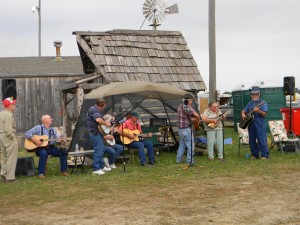 good too, and we stopped to listen for a few. It was then on to the blacksmith shop where we checked out some fine metal crafting by some locals. We dodged a few big tractors on the way over to an old schoolhouse, passing
good too, and we stopped to listen for a few. It was then on to the blacksmith shop where we checked out some fine metal crafting by some locals. We dodged a few big tractors on the way over to an old schoolhouse, passing 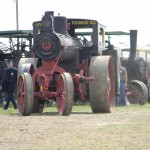 through an Amish village along the way. The old schoolhouse reeked of personality, circa late 1800s/early 1900s. As some kids were writing on the blackboard we took a look around, snapping a few more photos. This part of the day actually felt more like a class field trip than it did a gig. It was now getting to be time for load in, so we returned to the stage area to get to work.
through an Amish village along the way. The old schoolhouse reeked of personality, circa late 1800s/early 1900s. As some kids were writing on the blackboard we took a look around, snapping a few more photos. This part of the day actually felt more like a class field trip than it did a gig. It was now getting to be time for load in, so we returned to the stage area to get to work.
After our gear was loaded onto the deck, we set up and went about our sound check. Once we got it dialed in pretty good we took a few minutes to learn one of Rhett’s most recent songs, ‘Chicks, Trucks, and Beer’, a catchy little ditty with a funky beat he wrote a couple of days prior. It was then off to the hotel for showers, and this was when the weather started to go downhill. The sky grew dark, almost as black as night on the horizon, the wind picked up, and a short while later a massive downpour ensued. People were leaving in droves as we received over an inch of rain in about 45 minutes. Back on the deck, stagehands and local crew scurried to tarp the equipment, but nothing could be done to prevent the rest of this once dusty Fairgrounds from becoming one gigantic mud pit.
After the rain stopped, tractors began scraping down the mud in front of the stage. Underneath the mud was more mud, so they had to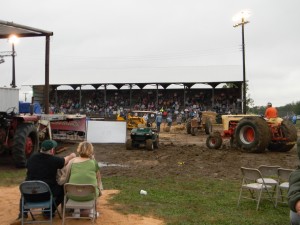 bring out bales of hay and spread straw to create acceptable conditions for the concertgoers. They also ran a series of boards for us to walk on from the stage to the bus (yes, the mud was actually that bad). Despite these obstacles we weren’t going to let a little rain and mud ruin this day, and by 7:15 the opening band ‘Little Dixie’ was taking the stage. Even though the deluge had run off a good portion of the festival attendees, there was still at least 1000 or so that stuck around for our show. At 8:15 we were off and running and about three songs in Rhett played ‘Friends with Tractors’ an obvious crowd pleaser for an
bring out bales of hay and spread straw to create acceptable conditions for the concertgoers. They also ran a series of boards for us to walk on from the stage to the bus (yes, the mud was actually that bad). Despite these obstacles we weren’t going to let a little rain and mud ruin this day, and by 7:15 the opening band ‘Little Dixie’ was taking the stage. Even though the deluge had run off a good portion of the festival attendees, there was still at least 1000 or so that stuck around for our show. At 8:15 we were off and running and about three songs in Rhett played ‘Friends with Tractors’ an obvious crowd pleaser for an 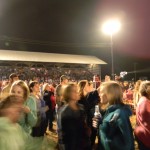 event such as this. The crowd was responsive and singing along, despite a strong prevailing wind that was a bit overbearing at times. About an hour into our show some massive lightning strikes began to appear on the horizon, so we did a couple of more songs to finish our set.
event such as this. The crowd was responsive and singing along, despite a strong prevailing wind that was a bit overbearing at times. About an hour into our show some massive lightning strikes began to appear on the horizon, so we did a couple of more songs to finish our set.
Our show complete, we tore down our gear and found our way over to the ‘Bluegrass Barn’ where the afternoon band was engaged in a little ‘pickin’ and grinnin’ after party. Rhett even sat in for a couple, leading the band through the Hank Williams classic ‘Honky-Tonkin’ and a couple of other rarities. The spirits were high, and everyone from this nice community made us feel right at home. A little while later, Steve made a mad dash with the bus across the muddy field, tires spinning every inch of the way. When we finally made it to the street, he made a big sigh of relief, perhaps having flashbacks of having to be towed out of a mud bog in Alabama earlier in the summer. Even if we had got stuck I wouldn’t have been too worried, at this show we definitely had ‘friends with tractors”. A few minutes later, and we were rolling down the highway. Thanks for making it a great event Shelbina!
Saturday night’s show at the U.S. Bank Balloons, Tunes and BBQ Festival in Bowling Green Kentucky turned out to be a huge success, but earlier in the day things were looking pretty bleak. All week long the weather forecast showed a strong possibility of severe weather for this area, as the remnants of Tropical Storm Hermine were projected to move through. When we arrived on site at the Warren County Regional Airport a strong steady wind was already blowing, despite an otherwise beautiful sunny day.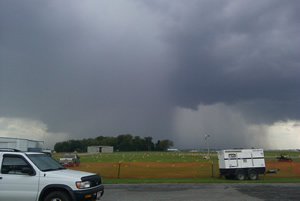
Right around the time we were about to start micing up our instruments for soundcheck, the sky grew ominously dark, and a few minutes later a strong gust of wind knocked over a large column of PA speakers. Fortunately, nobody got hurt, but it was a frightful moment. As a downpour was imminent, we quickly scrambled to put tarps over our stage gear. Minutes later we watched from the bus window as a strong steady rain pummeled the airport grounds. Just when we thought our day was completely doomed the rain subsided, and a short while later the sun returned to dry out the rain soaked grounds.
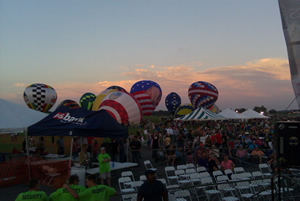 As it turns out, we got real lucky and it never did rain again. The first two days of the festival had been a complete washout due to the weather, but by late afternoon the winds had died down, and some hot air balloons began to permeate the sky for the first time on this weekend. By the time the first group, Easy Street, went on stage at 5:30 there was already a couple of thousand people in front of the large mobile stage, and their set was well received. A little while later, after the second band, Floord, was finished with their set, Nick Hoffman (Kenny Chesney’s fiddle player) took the stage with his band. During Nick’ set I organized and led a large meet and greet backstage with some radio station contest winners who were more than excited to meet Rhett.
As it turns out, we got real lucky and it never did rain again. The first two days of the festival had been a complete washout due to the weather, but by late afternoon the winds had died down, and some hot air balloons began to permeate the sky for the first time on this weekend. By the time the first group, Easy Street, went on stage at 5:30 there was already a couple of thousand people in front of the large mobile stage, and their set was well received. A little while later, after the second band, Floord, was finished with their set, Nick Hoffman (Kenny Chesney’s fiddle player) took the stage with his band. During Nick’ set I organized and led a large meet and greet backstage with some radio station contest winners who were more than excited to meet Rhett.
At about 8:45 it was finally our turn for some stage time, the crowd had now swelled to around 10,000, and was at the peak of this annual 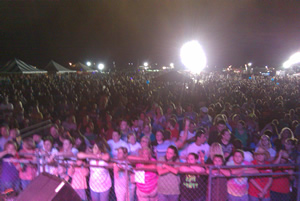 event’s outing. We dug in hard for a rockin’ 90 minute show, the crowd into it from the onset. About halfway through our show, Rhett brought up his son, Thomas Rhett to sing the soon-to-be classic ‘Duck Blind’. After this well received rendition, a woman somewhere near the front row yelled out “He’s real sexy too!” This helped prompt Rhett to prod young Thomas into doing one more song, ‘Tobacco’, one of Thomas’s original compositions which he performed solo acoustic. Apparently, Thomas takes after his dad, who bragged about his son’s first cut as a songwriter on Jason Aldeans’ latest album, and the fact that “Some day soon you’re going to be hearing Thomas Rhett on the radio too!” After Thomas left the stage to a roaring applause, we continued on with our set, and a little while later Rhett invited up Nick Hoffman to sit in for a couple of tunes on the fiddle. Rhett ended the show by playing a solo acoustic version of “Gimme That Girl” the blockbuster hit he wrote for Joe Nichols. This soft and soulful piece helped to wind down the electricity in the crowd, and upon its conclusion they began to slowly exit the concert grounds.
event’s outing. We dug in hard for a rockin’ 90 minute show, the crowd into it from the onset. About halfway through our show, Rhett brought up his son, Thomas Rhett to sing the soon-to-be classic ‘Duck Blind’. After this well received rendition, a woman somewhere near the front row yelled out “He’s real sexy too!” This helped prompt Rhett to prod young Thomas into doing one more song, ‘Tobacco’, one of Thomas’s original compositions which he performed solo acoustic. Apparently, Thomas takes after his dad, who bragged about his son’s first cut as a songwriter on Jason Aldeans’ latest album, and the fact that “Some day soon you’re going to be hearing Thomas Rhett on the radio too!” After Thomas left the stage to a roaring applause, we continued on with our set, and a little while later Rhett invited up Nick Hoffman to sit in for a couple of tunes on the fiddle. Rhett ended the show by playing a solo acoustic version of “Gimme That Girl” the blockbuster hit he wrote for Joe Nichols. This soft and soulful piece helped to wind down the electricity in the crowd, and upon its conclusion they began to slowly exit the concert grounds.
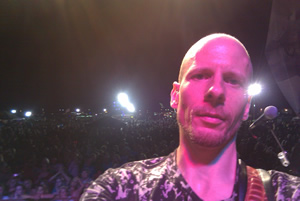 It was a long day, but a good day, and we were all thrilled that the weather wound up being on our side. While this isn’t always the case with these kinds of outdoor shows, past experience has taught me to always hope for the best, while preparing for the worst. We’ve got two more outdoor shows on the books in the upcoming weeks. Hopefully, we’ll get lucky on those too!
It was a long day, but a good day, and we were all thrilled that the weather wound up being on our side. While this isn’t always the case with these kinds of outdoor shows, past experience has taught me to always hope for the best, while preparing for the worst. We’ve got two more outdoor shows on the books in the upcoming weeks. Hopefully, we’ll get lucky on those too!
I was talking to a college student a while back who said he was interested in becoming a tour manager. It turns out that one of his best friends is an aspiring young artist with a bright future, one who will likely need a tour manager someday. “What does a tour manager do?” he asked. The specific duties can vary depending on the tour, but in general, the tour manager oversees all aspects of the touring entourage and coordinates each concert with the event buyer, production company, and all other pertinent parties. My job as tour manager for Rhett Akins requires me to wear a lot of hats; tour manager, band leader, lead guitarist – officially; and guitar tech, stage manager, assistant merch person, travel agent, part-time bartender, and occasional guidance counselor – unofficially. There are eight members of our entourage – Rhett, myself, three other band members, a sound engineer, a merch person, and a bus driver, and it is my job to make sure they are well taken care of when we are touring. To give some perspective, I thought it might be fun to take you on a recent one off with Rhett and gang. This post will be a bit long, but then again so is the day of a tour manager.
Rhett Akins
09-04-10 – Clay County Days Festival – Manchester Kentucky
It was about 11:30 PM on Friday, September 3rd when Kelly and I arrive to the bus near Opryland in Nashville, TN. Most of the other guys are already there and our sound engineer, Mike Jaeger, and bassist, Clint Jacobs, help me load my gear , Rhett’s merch, and some bus stock into the bays underneath the bus. Assistant tour manager and merch specialist, Kelly Normand, begins stocking the refrigerator with bottled waters and putting away some of the other supplies (paper plates, solo cups, etc.). On this run we have a substitute driver, and after making his acquaintance, I give him some paperwork and discuss some specifics of the trip. A little while later we pull out, bound for London, KY, the location of the hotel we would be using for our show at Rawlings Stinson Park in Manchester Kentucky. My official duties complete for this workday, I enjoy some chill time in the front lounge with the guys for a bit before heading to bed (or heading to bunk, rather).
Like most of our weekend runs, our bus arrives to a hotel parking lot sometime early morning and I awake a few hours later to begin my day. My first duty is getting checked into our hotel rooms, and this can require a special skill set (called charm) to get into these rooms at the early hour of 9 AM (most hotel check-in’s are between 1 and 3 PM). After offering a warm greeting to the hotel front desk clerk, I introduce myself – “My name is Eric Normand, I’m the tour manager for Rhett Akins and we’ve got four rooms booked with you. I realize it’s still kind of early, but I was wondering if any of them are ready.” “We should have a couple of rooms cleaned and ready in about 20 minutes and the other two in about an hour” she notifies me. “Great, thanks.” I return to the bus and eat some breakfast before returning to the hotel lobby for the room keys.
By noon, most everyone is up and hanging out in the front lounge. Were watching “Stand by Me” on the flatscreen TV as we head off for the venue, a 20 mile, 30 minute drive. While enroute I call my contact at the event to notify him we are almost there. We arrive on site and back the bus into a fire station parking lot across the street from the park. This is the closest the bus will be able to get to the stage which is located about an eighth of a mile away, and I quickly realize I’m going to get in a fair amount of walking on this sunny 70° day. I walk off the bus and meet, Gene, my go-to guy from this event for the day. “Tell me what you guys need, and I make it happen.” he informs me. “Everybody’s pretty hungry, so the bus stock would be great. After that we’ll need a pickup truck and some stagehands to cart the gear over the stage, and a runner to take our driver back to the hotel.” A few minutes later our bus stock is arriving, and I began to coordinate the load in.
After everybody eats, I find the runner who then takes our driver back to the hotel to sleep, and we begin our set up and sound check. As I still have a lot of details to tend to, I try to set up my gear as quickly as possible. Before I can finish, the event buyer requests a brief meeting with Rhett, as well as the handling of settlement (payment). Gene takes me via golf cart back to the bus so we can bring Rhett to meet the owner who is down the street cooking our BBQ dinner on a giant smoker. A little while later I’m back to the stage with sound check in full swing. Mike has done a good job of ‘ringing out the monitors’ and we are pretty much ready for Rhett. After running through two songs and making a few minor adjustments everybody’s pretty happy with the sound, so we ‘spike and strike’ our monitors and pedal boards to make room for the opening act.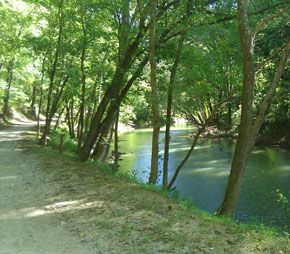
Typically, the conclusion of sound check would mean that we’re all returning to hotel rooms for showers, but as this day had a late afternoon sound check with an early show time, there wasn’t enough time. I told everyone this in advance, and most of them had already taken a quick shower late morning at the hotel. So today, it’s a couple hours of downtime on-site. Some of the guys go walking around the festival for a bit, others hang out on the bus watching college football, while Kelly and I explore a walking trail off the back side of the park. Dinner was served in the firehouse at five o’clock – a massive spread of pulled pork, ribs, potato salad, and some outstanding homemade creamed corn. In fact, the creamed corn tastes so much like corn, that I realize how little so many other ‘corn products’ actually taste like corn.
After dinner it’s time to set up our merch station, so I accompany Kelly to her tent to make sure she has everything she needs. Upon our arrival to her side stage location, I see that the event has provided a 10×10 pop-up tent, table, and a half a dozen folding chairs. While Kelly begins setting up her merch, I find one of the production company workers and ask him to run some power over to the tent for lighting. Once the lighting is set I begin preparing for Rhett’s meet and greet by texting him to notify him that it’s 10 minutes out. I verify with Gene that the meet and greet party has gathered, and deliver Rhett, sharpie in hand, to the green room. During the middle of this autograph-signing photo-op I get a text from Kelly stating that she needs more change and that one of her lights has a burned-out bulb. I locate a spare bulb and $100 worth of 5’s, make another walk to the stage area, and return to help wrap up the meet and greet.
I escort Rhett back to the bus, put a fresh battery in his in-ear wireless belt pack, and return to the stage to reset my gear. The opening band now finished and the stage clear, I place my pedal board, tune my guitar, and check my rig with a few quick power chords. I continue on to Rhett’s position, tuning his acoustic and checking it for signal, checking his vocal mic in the monitors and in the house, installing a pic clip with guitar pics to his mic stand, and placing set lists and a beverage on the stage floor by his monitor. The other band members are all at their stations checking their rigs, and a DJ is selling himself over the mic in that nonstop annoying ramble that only a DJ can do. The park is filled to capacity, somewhere around 4000, and we’re ready to go. I make one more walk back to the bus to shuttle Rhett over via golf cart. A few minutes later and were off and sailing on our 90 minute ‘countrified’ rockathon.
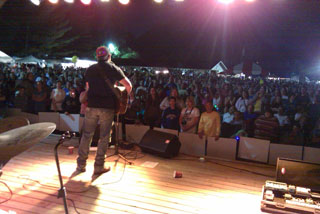 In a day so full of endless details, the nightly concert is by far the high point for me. For these 90 minutes I get to play my guitar with a great band, behind a great front man, and it’s all about the music for me. Rhett, being the quintessential performer, possesses the uncanny ability to render a crowd in the palm of his hands in about as much time as it takes him to walk out onto the stage. The concertgoers on this particular night are no exception to this rule, and Rhett quickly wins them over. For this brief period, it doesn’t even seem like I’m working, after all, this is what I set out to do in the first place. Aside from our usual repertoire, one standout is an impromptu performance of Bon Jovi’s ‘Wanted Dead or Alive’ (playing in all those early cover bands sure comes in handy every once in a while) and Rhett’s son, Thomas Rhett, joining us to sing a great rendition of ‘Duck Blind’. 90 minutes later our performance is complete, and the captive audience slowly makes their retreat as Rhett rides back to the bus via golf cart while the band tears down the gear. I quickly transition from musician mindset back to road manager and instruct Gene to pull up a truck next to the stage for load out. We load the gear, ride over to the bus, and load it into the bays. I send the runner to pickup our driver, they return about an hour later, and we fire up the bus to ride off into the night. My workday done, I enjoy a frosty beverage in the front lounge with the gang. I awake on the bus the next morning back in Nashville, load my car, and get the fuel receipts and some other paperwork from the bus driver. “Great job everybody, see you next week!”
In a day so full of endless details, the nightly concert is by far the high point for me. For these 90 minutes I get to play my guitar with a great band, behind a great front man, and it’s all about the music for me. Rhett, being the quintessential performer, possesses the uncanny ability to render a crowd in the palm of his hands in about as much time as it takes him to walk out onto the stage. The concertgoers on this particular night are no exception to this rule, and Rhett quickly wins them over. For this brief period, it doesn’t even seem like I’m working, after all, this is what I set out to do in the first place. Aside from our usual repertoire, one standout is an impromptu performance of Bon Jovi’s ‘Wanted Dead or Alive’ (playing in all those early cover bands sure comes in handy every once in a while) and Rhett’s son, Thomas Rhett, joining us to sing a great rendition of ‘Duck Blind’. 90 minutes later our performance is complete, and the captive audience slowly makes their retreat as Rhett rides back to the bus via golf cart while the band tears down the gear. I quickly transition from musician mindset back to road manager and instruct Gene to pull up a truck next to the stage for load out. We load the gear, ride over to the bus, and load it into the bays. I send the runner to pickup our driver, they return about an hour later, and we fire up the bus to ride off into the night. My workday done, I enjoy a frosty beverage in the front lounge with the gang. I awake on the bus the next morning back in Nashville, load my car, and get the fuel receipts and some other paperwork from the bus driver. “Great job everybody, see you next week!”
This one-off is typical for a small to midsized tour, such as ours. On tours of this size and nature, the tour manager advances these details over the days and weeks preceding the show (quite often it is these advance phone calls and e-mails that make or break how well each show day and show goes). In the days after a weekend run, the tour manager addresses payroll, bank deposits, bus lease payment, and some light accounting duties while advancing upcoming shows. On a larger more active tour, there would simply be more tour members, more tour buses, and more equipment, and they would likely be staying out for longer periods of time. A day similar to the one I just described would be repeated in succession, kind of like Groundhog Day, each day beginning the same as the last – the view of an obscure parking lot from the bus window, somewhere far from home. On one of these tours, the ‘TM’ would still be the grand overseer, but would be delegating many of these roles to others – stage managers, guitar techs, etc. He still has to deal with all the same kinds of details, he just doesn’t have to wear as many hats. Don’t get me wrong, I’m not complaining about wearing so many hats, he probably doesn’t get to play guitar during the show.
My name is Eric Normand and welcome to ‘Country Concerts’!
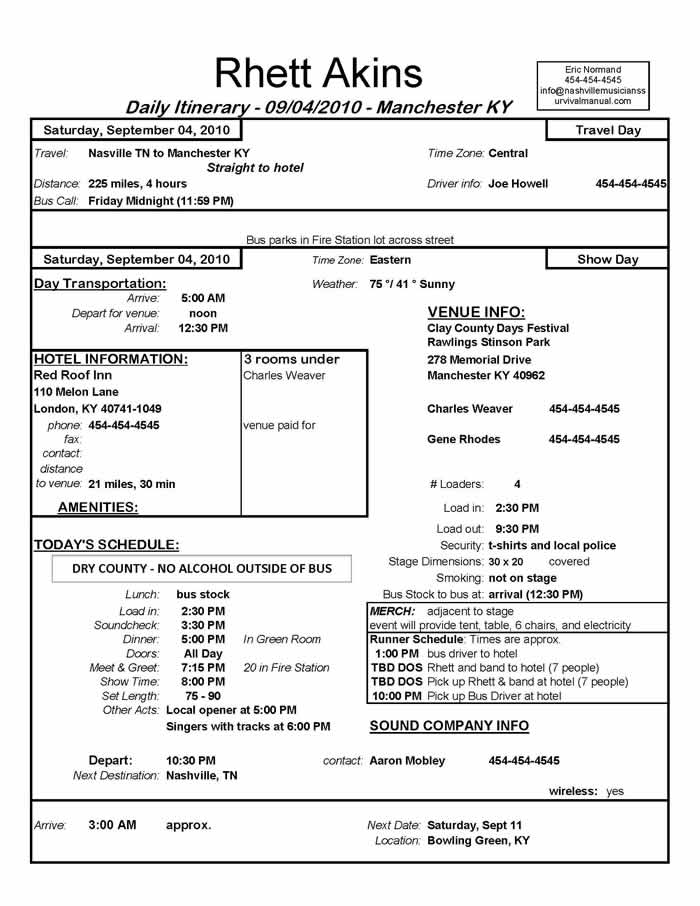
In my blog yesterday I asked for your questions about Nashville, and received several good ones in the comments section and on my Facebook page. So I decided to put them all together with my answers in today’s blog. Here’s what I know about what y’all wanted to know.
Who do I need to meet and where to hang out to get exposure as a musician?
This is one of the biggest questions people ask. There is no short easy answer either. That question and the answers to it are essentially what my book project is all about. Here are the short answers:
“Who do I need to meet to gain exposure as a musician?”
Everyone in the music community that you possibly can! With each musician or music entrepreneur you meet comes a whole new set of possibilities. You never know where each new road might lead. Keep in mind that the identity of many musicians and industry professionals won’t always be obvious either. You could be standing in line at the supermarket next to a record producer and not even know it. Somebody that looks like a homeless person in a bar could be a hit songwriter. And of course, just meeting these people is only a first step. Most people that become successful in this business do so by slowly nurturing relationships over a long period of time.
“Where do you need to hang out to gain exposure as a musician?”
In Nashville, the face-to-face meeting of musicians in nightclubs and music venues around the city still works best. You can’t go wrong by making the rounds at the clubs on Broadway, Music Row, the Fiddle and Steel, the Bluebird Café and the Commodore Lounge for songwriters, etc.
In this day and age a lot can be accomplished via the Internet as well. I have made some amazing contacts for my book project just by sending e-mails to industry people I found on websites or Google searches. With this approach I have had correspondence with Derek Sivers (founder of CD baby), a music business professor at the University of Miami, etc. The Internet can enhance your visibility as a musician or performer but should not replace face-to-face encounters in public.
Where are the Nice Southern Gentlemen?
I’m not sure what you’re looking for exactly. But I would say that most men that live in the South are somewhat ‘gentlemanlike’ (you know that whole Southern hospitality thing). It even wears off on some of us northern transplants eventually!
I’m wondering if it would be a good place to put some of my uncle’s shows. They’re all cabaret style shows. Most music based.
Nashville might be a good place for that kind of show, but then again it might not be. It all depends on whether or not he has a draw here. There are many decent music venues in Nashville, so if he has built a big enough fan base, via touring and/or the Internet, he might do okay. But if he’s not known in this region he will have a hard time drawing a crowd, and the local Nashville venues won’t pay much to an unknown act. He might want to consider trying Branson, Missouri, as that city is more known for these types of shows. Of course, they will expect him to draw as well.
Favorite Restaurant?
Generally speaking, I make it a point to never eat in restaurants, as restaurant food is generally unhealthy. But there are plenty of popular restaurants here for those who do enjoy them. This 2009 article from the Nashville scene ‘Best of Nashville 2009: Food and Drink’ outlines some of the city’s most popular places.
Personally, I would recommend buying some good healthy ingredients at Whole Foods (either at Green Hills, or in Franklin), and cooking a great meal at home. You can find some great recipes on a site called Do It the Hard Way.
What songs do you need to know if you want to jam at Fiddle and Steel?
To be prepared to sit in at the Fiddle and Steel, or any other similar bar in Nashville for that matter, knowing what I call ‘The Nashville 100’ is essential. The Nashville 100 is a list I have comprised of what I have found to be the most commonly covered standards played in Nashville. The list is posted on the Survival Guide site, follow this link to view it http://nashvillemusicianssurvivalmanual.com/list.html. While these aren’t the only songs that might be played, knowing these songs will give you a lot of common ground with most players in town.
Best places to live? I hear a lot about east Nashville, so that must mean its over-crowded with wanna-be hipsters. Any other cool neighborhoods off the radar and reasonably priced?
The neighborhoods in east Nashville can vary greatly. There are some decent areas and some rough spots as well, but apartment rentals in that area are generally affordable. The same thing could be said about many parts of the city. Reasonably priced apartments ($600 – $750 for a single bedroom) can be found in Belmont, Bellevue, Donelson, Gallatin, and many other outlying communities.
The desirability of an area could also be determined by whether or not you will have children living with you (ie quality of school systems, crime rates, etc.), and if you will be commuting in and out of the city during daytime hours (East and North of the city generally have the worst traffic backups).
What kind of gear should a guitar player have for studio gigs vs touring gigs?
Many of the successful Nashville based session guitarists have rigs consisting of multiple guitars; Teles, Strats, Gibsons, PRS etc., multiple heads; Class A style head (Matchless, Dr. Z, etc.), Marshall style head, and maybe a Fender style head, and a refrigerator rack full of effects with some type of pedal board set up as well. This kind of setup would be more typical for a full time A list session player. There are plenty of players who work in the studio on much simpler rigs but still have the ability to deliver a wide range of tones. Of course there are some ‘niche’ studio players that only have one basic sound and get calls to do that one thing they do best.
As far as touring rigs go it depends on the gig. But for most country/pop/rock gigs, a Tele style guitar, Class A combo, and a pedal board with the essentials (a clean boost or compressor, overdrive, delay, and tuner) will suffice (amp and pedals in Anvil style cases). A backup guitar is always a good idea too.
How are you liking it? Bartlett St. to “oprayland”
I’m loving it! Bartlett Street in Kingston New Hampshire was a great place to grow up, but Nashville has definitely become the home of my second life. There was a bit of culture shock over the first couple of years, but I am now well adjusted. I still do miss a lot about New England – friends, family, having the ocean in my backyard, autumn foliage, summers where it’s not 100° every day for four months. But the experiences I’ve had, the people I’ve met, the places I’ve been, the skills I’ve gained, I wouldn’t trade it for the world!
Thanks again everybody for your participation in my informal survey, it definitely gave me a lot of perspective. Many of these questions are answered in much greater detail in my book project which is still in the works, but some of them are bringing up points I wasn’t already thinking of. Ultimately, some of these new points will also be addressed in the book.
For those of you that haven’t yet fully explored this site, you will find that some of these questions are addressed in more detail within it. I’m thrilled with the response I got to my query and urge you to ask more questions if you have them, preferably in the comments section of these blogs. Thanks again and happy reading!
Nashville is a destination for people from all over the world, and those considering relocation to Music City often post questions on the Nashville craigslist and other message boards about what it’s like to live and work here. While my website and soon to be completed book ‘The Nashville Musician’s Survival Guide’ serve to answer these kinds of questions, your input is badly needed.
In the spirit of providing the information that you are looking for the most, I would like to conduct a kind of informal survey.
I want to know what you want to know about Nashville. What you want to know about living here, working here, becoming involved in the music community, the climate, the culture – you name it.
If I know the answer, I’ll post my thoughts and feedback. If I don’t know the answer, I’ll research it and post my results.
In the true spirit of perpetuating a sense of community in a music business that often lacks it, I would like to keep this discussion public. So I urge you to post your questions as comments here on this blog rather than sending me e-mails.
Your questions and thoughts will help me to provide the most accurate information possible and will help many other musicians in the process. Thanks for participating!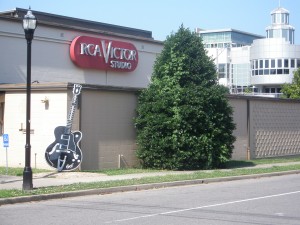
It’s about 1:00 AM and were traveling east on Interstate 40 on our leased Prevost XLII tour bus, just a little bit east of Knoxville, Tennessee on our way to Manteo, North Carolina. I’m getting kind of sleepy so I say goodnight to our bus driver, Steve and the rest of the guys and crawl into my bunk. After a while I am lulled to sleep by the soft cushy ride and steady drone of the diesel 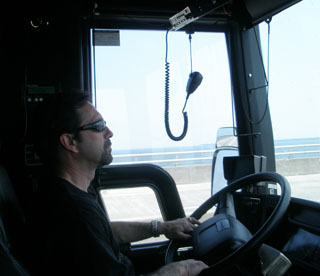 engine. Barring the occasional pothole, the sensation of this ride from the interior of my bunk is almost boat-like – more like floating down the highway. I fall into a deep sleep and awaken some hours later, unsure of whether the bus is still in motion or parked and idling, as the diesel moan is unwavering at this point. When the pitch of the engine raises slightly a few minutes later I realize we are still moving, although you would never know it because the ride is so smooth. I fall back to sleep and wake up several hours later, again unsure of whether or not the bus is still in motion. Upon walking into the front lounge I now realize that we are parked at a rest stop. I never even felt the bus stop.
engine. Barring the occasional pothole, the sensation of this ride from the interior of my bunk is almost boat-like – more like floating down the highway. I fall into a deep sleep and awaken some hours later, unsure of whether the bus is still in motion or parked and idling, as the diesel moan is unwavering at this point. When the pitch of the engine raises slightly a few minutes later I realize we are still moving, although you would never know it because the ride is so smooth. I fall back to sleep and wake up several hours later, again unsure of whether or not the bus is still in motion. Upon walking into the front lounge I now realize that we are parked at a rest stop. I never even felt the bus stop.
A few minutes later Steve returns to the bus after topping off the tank. “Good morning Eric!” he says in a cheerful tone despite the fact that he was fairly tired from 8 plus hours of driving. I greet him with the one question he is asked the most “Are we almost there yet?” “About an hour out” he announces. With that I return to my bunk for some more sleep. After dozing off for a bit I awake, again unknowing whether or not the bus is stopped or in motion. This time when I walk to the front lounge I know we are at the hotel as Steve has checked into the hotel rooms and left the extra room keys and a note on the table. A short while later he returns and we taxi the bus 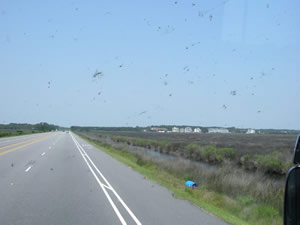 over to the venue for load-in.
over to the venue for load-in.
“The generator has a bad voltage regulator.” he notifies me “I’ll need to get a part to fix it or we won’t be able to use it today.” I set him up with a runner and he’s off to the auto parts store. A little while later we’re loading in and he returns with the new part and begins working on the bus on this sweltering 95° day. I know he must be exhausted by now as he’s just finished a long drive and now into mechanic duties, but you’d never know it as he continually projects a positive attitude. A little while later and the ‘genie’ is fixed, he empties the trash, does a quick vacuum of the front lounge, and is finally off to the hotel for sleep. As a tour manager, it is my duty to take care of the bus driver – to make sure he has whatever he needs – be it a ride, a meal, a quiet hotel room, etc. Even though he works like a machine, he is still human and gets tired like the rest of us.
While this story doesn’t contain the apparent drama of some of the more obvious ‘hell ride’ stories regarding bus travel, perhaps what is most interesting is what doesn’t happen. We don’t get tossed around like concrete in a cement mixer. We don’t get scared to death because we hear the rumble strip more often than we don’t. We’re not made to feel uncomfortable because the driver is socially inept. We don’t have to worry about not getting a good night sleep because we will. We don’t have to worry about any of these things because our driver is a consummate professional and a great guy.
The Nashville Musician’s Survival Guide contains several chapters pertaining to bus travel – including a chapter about bus drivers, and an extensive interview with one of the best in the business, a driver we are extremely fortunate to work with, Steve P. (Steve is such a great driver, that I am omitting his last name for the time being, in fear of him being stolen by another tour) The following excerpts were taken from that interview.
Steve P has been a professional tour bus driver since 1989 and has logged hundreds of thousands of miles driving some of the biggest names in rock, pop, and country to concert destinations throughout the US and Canada. Included in this list of touring artists and bands are: Hank Williams Jr., Rascal Flatts, Faith Hill, Rod Stewart, Dave Matthews, Jeff Beck, Creed, The Other Ones, Jimmy Buffett, and many more.
A native of Bowling Green, Kentucky, Steve is retired from full-time driving, now working as an ASE certified mechanic at the Nashville based Prevost bus shop as a team leader/shift supervisor. He still enjoys driving part time, going out on weekend runs regularly.
{Eric Normand} In the world of commercial driving many drivers including those who drive semis, delivery trucks, Greyhound buses, city buses, aspire to drive entertainment coaches. Why does everyone want to drive an entertainer coach?
{Steve P} I think they all think it’s a glamorous position to be out there on the road with some top name touring act, the draw of the prestige. It’s just the simple fact of driving a very nice entertainer bus that’s polished up and shiny. It just kind of draws them in.
{EN} What is different about how you approach driving an entertainer coach compared to these other types of commercial driving?
{SP} Well I’ve never driven a truck, but to drive a bus you just have to be smooth. Even though you’re sitting in front, you have to put your head in the back, to where the passengers are riding, and every move you make effects what’s going on back there. You can’t be hard on the brakes, rough on the in and out of parking lots. You can’t make sudden and drastic moves unless absolutely necessary.
{EN} Many of these other commercial drivers that aspire to drive entertainer coaches think they are qualified simply because they drive a large, heavy vehicle. In what ways are they not prepared?
{SP} Just sitting in the driver’s seat and driving a bus isn’t all of it. You have to be able to get along with the clients. Sometimes you’re a maid, sometimes you’re a babysitter, sometimes you’re a plumber, an electrician. Driving’s the easy part.
{EN} It’s no secret in the touring industry that good bus drivers are not only in demand, they are well paid. What is an average yearly income for a bus driver working on a busy tour?
{SP} You could easily make $100,000 a year. You could make as much as you want to be gone basically. If you don’t mind being gone year-round, you’re a single guy, no kids, and don’t mind being on the road, you can easily make 100 grand or more.
{EN} What do you love about being a bus driver?
{SP} Just the travel and the experience. To go all over the United States and Canada, I don’t think I would have gotten that opportunity with any other career that I would have chosen. And, meet some interesting people on the way.
{EN} What is one of the things you like least about being a bus driver?
{SP} It sounds contradictory but, being gone all the time. Yes, I enjoyed it, but when you’re on the road for six months, it gets old, especially after doing it for years and years. When you’ve been to the same town, and the same venues, and the same hotels again and again and again, it’s kind of like Groundhog Day.
As Steve mentioned, there is much more to this job than simply driving. While safety and delivering a smooth ride is of the utmost importance, keeping the bus relatively clean, keeping the fuel and water tanks full, addressing mechanical problems, even checking into hotel rooms, are common duties for tour bus driver. And of course, getting along with the clients and contributing to an overall “good vibe” is key. More from Steve later…
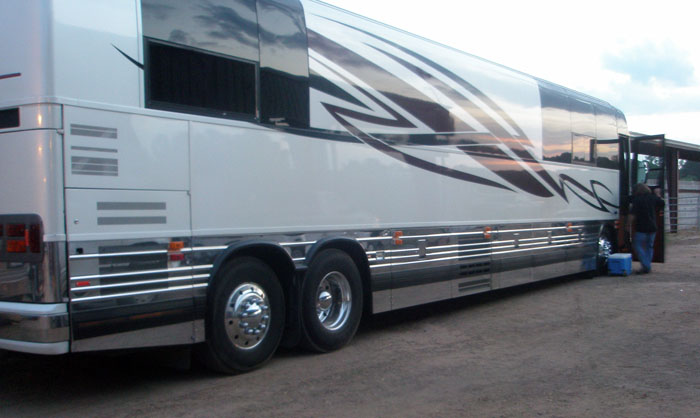
It was a warm Wednesday night in July of 2007 when the Rhett Akins tour left Nashville, Tennessee, bound for Macon, Georgia, on what would be a four city run across the deep South. The bus, a still shiny and new looking 2005 Prevost XLII, wreaked of personality, while the driver, Les, was somewhat reserved and looked a bit less than shiny and new. As is typical in the world of one-off bus leasing, this would be our first and only trip with this driver, and although he seemed to drive okay, we knew almost nothing about him. Well, over the next four days we would 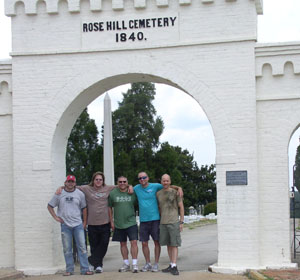 learn everything we needed to know about ‘Mr. personality’.
learn everything we needed to know about ‘Mr. personality’.
The six-hour ride to Macon was uneventful enough, and I didn’t even wake up when we pulled into the Ramada Inn parking lot. The rest of the day went pretty smoothly, and we even managed to fit in a visit to the infamous ‘Rose Hill Cemetary’, the Allman Brothers early stomping ground and eventual resting place of Duane Allman and Berry Oakley. Our show at the Cox Capitol Theatre later that night went well, after which we taxied the bus back to the hotel to sleep over as our next destination, Thomaston, Georgia, was only 50 miles away.
We left Macon at 11:00 AM on Friday morning for the one-hour trip to the small town of Thomaston, Georgia, eventually landing in front of ‘Q’s Downtown Grill and Music Hall’, and had a little down time between our arrival and load-in. Most of us were hanging in the front lounge when Les began his first in a series of rude and inconsiderate commentaries. “I was just offered an $85,000 a year driving job, but I think I’m going to turn it down” he boasted. “Why? That sounds like a great gig” one of us asked. “I usually make a lot more than that. Last year, I made $120,000” he continued in an annoying offhand manner. “What an asshole!” we all thought. We all knew that bus drivers make a ton of money but didn’t need to be reminded just how much more they make then the rest of us.
A short while later we sent Les off to his hotel room for sleep and went about our day. Rightafter load-in the wind picked up outside and it began to pour. Some severe weather had moved in and the power was knocked out for a while. We later learned that a tornado had touchdown a couple of miles away, but fortunately the weather passed, the power came back on, and we continued about our day. We played our show that night to a packed house, loaded out, and enjoyed some late night partying on the bus while we waited for our driver. As luck would have it, the runner was late picking up Les, who apparently had to wait in the hotel lobby for about 45 minutes. So by the time Les arrived back to the bus, he was somewhat agitated and had a hard time concealing this.
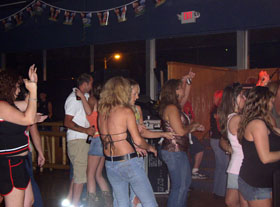 Sometime around 3 AM we began the 7 Hour drive to Augusta, Georgia, although now, the quality of the drive was noticeably rougher. Other than some hard braking at a few points, we assumed that the rough ride was just due to some poor road conditions across that part of the state. By the time we pulled into ‘The Country Club’, the happening nightspot in which we would be performing on this Friday night, a red carpet had been laid out for our arrival. Band and crew quickly attacked a huge platter of chicken fingers, shrimp cocktail, and a veggie plate that had been set out for us in the green room.
Sometime around 3 AM we began the 7 Hour drive to Augusta, Georgia, although now, the quality of the drive was noticeably rougher. Other than some hard braking at a few points, we assumed that the rough ride was just due to some poor road conditions across that part of the state. By the time we pulled into ‘The Country Club’, the happening nightspot in which we would be performing on this Friday night, a red carpet had been laid out for our arrival. Band and crew quickly attacked a huge platter of chicken fingers, shrimp cocktail, and a veggie plate that had been set out for us in the green room.
We sent Les off to his room, loaded in, and sound checked. This was of course followed by dinner, hotel time, and a blistering performance to a packed house of 1000 plus concertgoers and parties. The crowd was overly enthusiastic on this hot summer night and the party spilled out into the parking lot after the show. By the time Les returned around 2 AM the front lounge of the bus was full of nightclub patrons and in full ‘K-tel dance party’ mode. There was also 30 or 40 people hanging out in the parking lot near the bus, and this is where Les delivered his next uncanny remark. “Does Rhett party like this every night?” he said judgingly. “Every night’s different, sometimes we party a little bit, other times we’re tired and go to bed. Why do you care?” I answered, now annoyed with this would-be high school prom chaperone. “It just seems pretty irresponsible to me. Not a good way to run a business.” he grumbled.
About an hour later we set sail for Myrtle Beach, South Carolina, the final stop of this five legged bus ride that was getting rougher every minute. Apparently annoyed by our after show activities,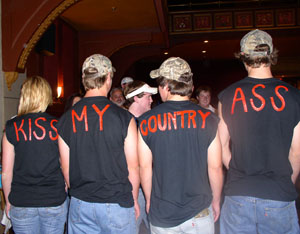 Les tossed us around pretty good for the five hour trip, perhaps as some sort of punishment for having “too much fun”. A lot of side to side sway, hard braking, you know, the kind of bus driver tendencies typical of a moron. We pulled into the parking lot of ‘The Boathouse’ which was the venue we would be playing, and this time I was instantly awoken as the bus jerked to a quick, hard stop. A little while later I sent Les off to his room at the adjacent Holiday Inn, notifying him that we planned to depart for home at 11 PM that night.
Les tossed us around pretty good for the five hour trip, perhaps as some sort of punishment for having “too much fun”. A lot of side to side sway, hard braking, you know, the kind of bus driver tendencies typical of a moron. We pulled into the parking lot of ‘The Boathouse’ which was the venue we would be playing, and this time I was instantly awoken as the bus jerked to a quick, hard stop. A little while later I sent Les off to his room at the adjacent Holiday Inn, notifying him that we planned to depart for home at 11 PM that night.
Saturday proved to be another great outing for Rhett and band, an outdoor summertime concert behind a nightclub on the banks of a river. Again, the day’s activities and concert went quite well, with the biggest drama being delivered by our wing-nut bus driver at the end of the night. Our show had ended at 9:30 and we were all hanging out inside the bar waiting for the 11:00 PM bus call. Around 10 of, I walked out to the bus to see if Les was ready. Upon opening the bus door I was astonished to see him sitting in the driver’s seat smoking a cigarette (In case you’ve never ridden on a tour bus, in general, this is a no-no). Smoking on our busses is only permitted while the bus is in motion, as this will allow the smoke to ventilate out an open window. I asked him to not smoke on the bus while not moving, and he reluctantly extinguished his cigarette.
I told him I would go get the rest of the guys and that we could leave shortly. Upon returning to the bar I quickly realized a couple of the guys must’ve gone over to the hotel, and called them to tell them we were ready to leave. When I returned to the parking lot I was dumbfounded to see the tail lights of our bus growing smaller in the distance as Les was apparently more than ready to be done with us. When I called him on my cell phone and asked “What are you doing?” he sarcastically answered “Are you ready to go yet?”. “Well yeah, I was just rounding up the guys. I told everyone were about to leave, and next thing I know I’ve got guys running after the bus across the parking lot carrying 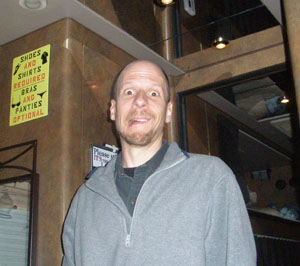 suitcases. What the hell are you doing?” “All right, I’m coming back now.” He said in a cocky tone of voice, almost as if this was some sort of weird game of bus driver/tour manager chicken.
suitcases. What the hell are you doing?” “All right, I’m coming back now.” He said in a cocky tone of voice, almost as if this was some sort of weird game of bus driver/tour manager chicken.
He brought the bus back, we hopped on, and took off down the highway, more than ready to be done with this jack-off. About an hour Into the drive, our drummer, Cliff, informed me that he had left his suitcase back at the hotel. I was horrified. I was already at a breaking point with this driver, and it seemed like he hated driving us. This is the last thing I wanted to do, but I had to do it. “Hey Les, I hate to tell you this, but Cliff left his luggage back at the hotel and we need to go back and get it.” After muttering some sort of offhand comment under his breath, he literally locked up the brakes, sending people flying as bottles fell off the counter and smashed on the floor. Again, I was dumbfounded. “What the hell you doing? He didn’t forget his bag on purpose. We want to be done with this trip just as badly as you do. Do you really think we want to spend an extra two hours on this bus with you?” I unleashed.
“Sorry about that. I didn’t mean to hit the brakes that hard.” he said. I then added “So far on this trip, each night your driving has gotten rougher and rougher. We don’t care about making good time on these trips, we want a smooth ride so we can sleep. Do you think you can lose the attitude just long enough for that to happen?”
With that, he turned around, went back for Cliff’s bag, and then began the 600 mile trip home two hours later, and for the second time. I guess the only satisfaction we got out of this was the knowledge that we made the final leg of the trip two hours longer than necessary for “les the mess’.
I’ve been on a lot of buses, with a lot of different drivers, but this particular trip was a first. Never, and I mean never, have I had a driver just drive a waiting tour bus off into the night without telling somebody. Never have I seen one smoke a cigarette in the driver’s seat while the bus was parked. Never have I had a driver question our organization, or our right to party after the show. But then again, never had I ever experienced the exceptional bus driving skills of ‘Les the wing-nut’.
